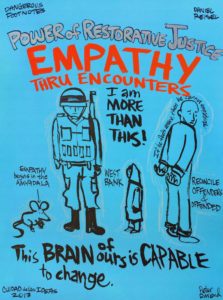Healing Circles
Feminism and Restorative Justice
October 10, 2019The Inherent Feminism of Restorative Justice
Unpacking the legal model that puts victims first
By Anna Dorn
MEDIUM
Van Wormer explained that restorative justice has a “special relevance to marginalized communities, one of which is women.” Likewise, Walker told me that given pervasive gender bias in our culture, women are at greater risk of being harmed by the adversarial system. Women of color, she explained, are even more vulnerable than white women because the party facing more societal bias is at a greater disadvantage in the adversarial system. “If one party is bigger and stronger than the other, how can a fight between them ever be fair?”
Walker further suggested that restorative justice is inherently feminist. Rather than “paternalistic, autocratic and adversarial,” she wrote, “restorative justice is strength based and respects individuals [including women] as agents of their own lives.” Van Wormer likewise argued that the use of restorative justice is often consistent with feminism, which values empowering women and promoting our voices. Of special relevance to women’s victimization, van Wormer explained, are the following feminist values: reliance on the woman’s personal narrative; acceptance of a holistic, nondichotomized view of reality, including a unification of the personal and political; a focus on choice and options; an understanding of the gendered nature of societal power relations; and an emphasis on personal empowerment and dignity.
Walker further suggested that restorative justice is inherently feminist. Rather than “paternalistic, autocratic and adversarial,” she wrote, “restorative justice is strength based and respects individuals [including women] as agents of their own lives.”
Van Wormer outlined the four restorative justice models most relevant to women: victim-offender conferencing, family group conferencing, healing circles, and community reparations. Victim-offender conferencing brings together parties in which one person has injured another to resolve and, where possible, right the wrong. Unlike mediation, which implies a dispute to be negotiated, restorative conferencing recognizes its participants as victim and offender as opposed to disputants.
https://medium.com/s/all-rise/the-inherent-feminism-of-restorative-justice-71eca6fa9f42
